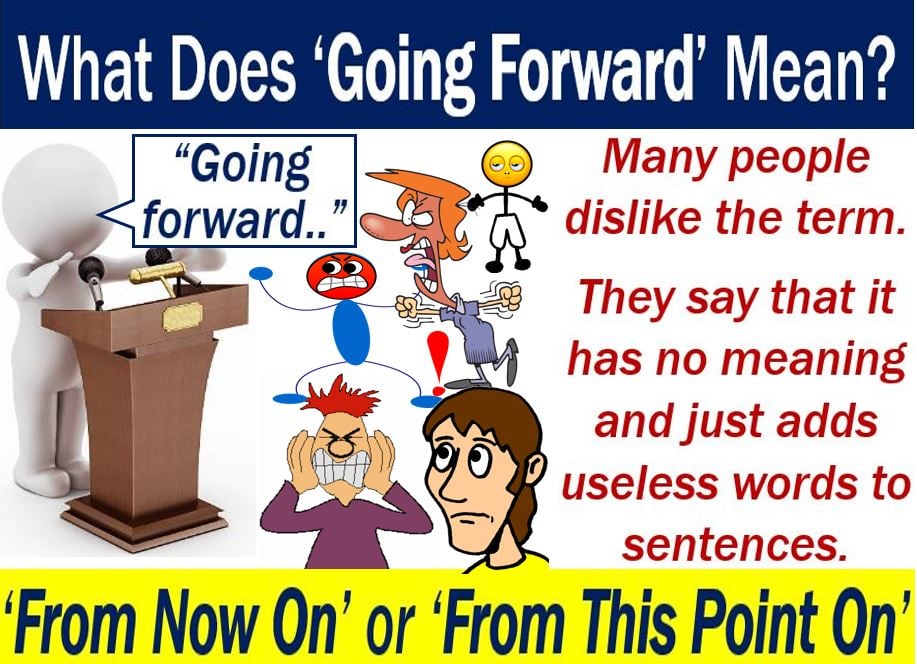The term Going Forward means ‘from now on‘ or ‘from this point on.’ It is a relatively new way to indicate a progression in time from now, i.e., the present. In most cases, we say ‘going forward’ to suggest a change in previous actions or behavior. For example, what does it indicate if I say “Going forward, we will consider senior applicants for job vacancies.” It suggests that before we did not consider senior job applicants.
The term ‘moving forward’ has the same meaning as ‘going forward.’ ‘Moving forward‘ is also relatively new.
Many people do not like the term. In fact, some people even find it annoying, along with other ‘new’ terms like ‘period of time.’ ‘Period of time’ means the same as ‘period,’ therefore the two words ‘of time’ are redundant.
Going forward – a progressive movement
Unlike other expressions and phrases that point to the future, ‘going forward’ suggests a continuing movement. It suggests a progressive movement rather than some future specific moment.
This comment on English Stack Exchange reflects many people’s opinion about the term:
“Going forward is almost a completely useless phrase. If one says [x] going forward, they mean [x] into the future, but it is very redundant, as one could just as easily say [x].”
“It seems that many business people want to sound as fancy as possible, so they use as many fancy words as possible to get the same point across. This leads to entire dialogues of contentless speech, filled with words devoid of meaning.”

UrbanDictionary.com makes the following comment:
“A completely unnecessary and meaningless corporate buzz phrase that somehow gets shoehorned into every memo, press release or public statement.”
“It can always be eliminated from the text without any effect at all upon the intended meaning.”
Going forward – who says it?
Like many new expressions, ‘going forward’ is a frustratingly vague term which seemingly has meaning. However, it does not add much meaning to a sentence.
In fact, in most cases, the message would be the same if the term was omitted.
TechTarget.com says that company directors commonly use the term in annual reports and press releases. Some news media writers use it a lot. Others, however, deliberately never use it.
TechTarget.com adds:
“The term has become increasingly popular in press releases from Internet start-ups and newly public companies.”
Mark Seacombe, writing in the Guardian, says that former US President Barack Obama used the term when in office. Former UK Prime Minister David Cameron also used it. Advertising people and film stars love adding it to sentences.
Seacombe writes:
“Let’s not utter or write the superfluous, meaningless, ubiquitous ‘going forward.'”
The author’s opinion
Personally, I dislike the term. I avoid using it. In fact, I only ever use it when making a criticism.
I am 61 years old, and sometimes wonder whether my age explains my resistance. The older we get, the more we resist new things.
However, I welcome new terms if they help us express ourselves better. For example, I welcome the terms ‘SEO (search engine optimization)’, website, and ‘dot.com bubble.’
Search engine optimization refers to techniques to boost your website’s appearance on search engines.
Video – going forward
In this video, David Mitchell tells us what he thinks of the term. He also wonders whether it will eventually become an expression that everybody uses.
‘Going forward’ implies advancement, when, in fact, all it does is describe the passing of time. That is what he hates the most about the term.
